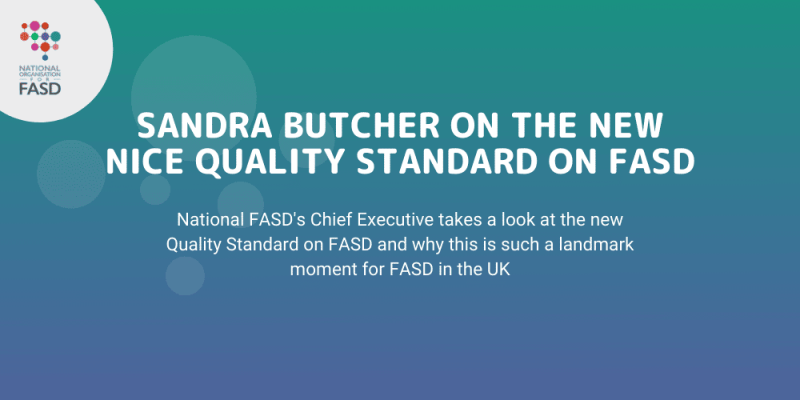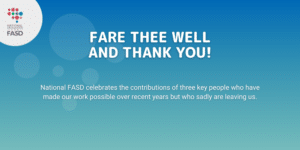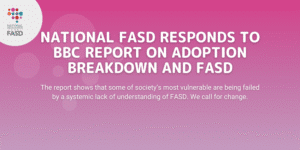This blog post is by National FASD’s Chief Executive Sandra Butcher. Sandy was a lay member on the NICE Quality Standard Committee. This is a personal opinion, she is not speaking for NICE.
For National FASD’s statement on the NICE Quality Standard, please click here.

The new NICE Quality Standard on Fetal Alcohol Spectrum Disorder (FASD) is a massive step forward for the UK’s FASD community. Taken with other recent policy shifts, it represents officialdom now saying that FASD is recognised, and the struggles that people with FASD and their supporters face are real. The country must take note and local decision-makers should take action. It’s not going to change things overnight and it’s not perfect. But it is leaps and bounds ahead of where I thought we might be when the NICE Quality Standard process began.
What is a Quality Standard and why does it matter?
NICE Quality Standards “describe high-priority areas for quality improvement in a defined care or service area. Each standard consists of a prioritised set of specific, concise and measurable statements…. Quality standards are intended to drive up the quality of care, and so achievement levels of 100% should be aspired to… NICE guidance and quality standards apply in England and Wales. Decisions on how they apply in Scotland and Northern Ireland are made by the Scottish government and Northern Ireland Executive… NICE quality standards should be achievable by local services.”
NICE Quality Standards are not mandatory but local areas must “have regard” for them and report on progress in meeting the improvements outlined.
What is in the NICE Quality Standard on FASD?
This Quality Standard covers assessing, diagnosing, and supporting fetal alcohol spectrum disorder (FASD) in children and young people. It also covers support during pregnancy to prevent FASD. It describes high-quality care in priority areas for improvement.
Woven throughout the Quality Standard are references to the need for local areas to ensure professionals are trained-up appropriately and that those engaged in diagnosis and care for those with FASD have FASD training – and that they should show this via measurable indicators. That one point alone will change lives. I have no doubt about that. Families like mine know “the power of one” – the difference one FASD-informed professional can make in the trajectory of our loved ones’ lives.
The Quality Standard has five statements that cover everything from pregnancy through to diagnosis and support.
Care management for those with FASD – imagine the difference this will make
I am going to flip the order and start with the fifth statement because to me, this is the massive sea change. It says, “Children and young people with a diagnosis of fetal alcohol spectrum disorder (FASD) have a management plan to address their needs.” It says “clinical commissioning groups, integrated care systems and NHS England ensure that they commission services that provide a management plan and support for children and young people diagnosed with FASD. Children and young people with FASD and their parents or carers develop a management plan with the team who carried out the assessments before their diagnosis. They discuss what the plan should cover, their priorities and goals, and who the plan should be shared with.”

It also says “Because FASD has lifelong effects, a staged management plan may be needed to anticipate upcoming problems at planned intervals and revision should be considered at all transition stages in the person’s life. A management plan also helps people with FASD, their families, carers and service providers to understand and address the associated challenges. The plan helps to coordinate care across a range of healthcare professionals, as well as education and social services, and improves outcomes.”
Music. To. My. Ears. The day our son finally got his diagnosis, at the age of nearly 10 (he was adopted at 16 months), we were sent on our way. We were lost. I went into what I think now was a mild depression. Life was so full on; we couldn’t figure out what it all meant. Care management plans hopefully will ensure others don’t face that post-diagnosis period without a realistic and practical way forward.
Ensuring a proper assessment for those at risk of FASD and a full neurodevelopmental assessment for those with prenatal alcohol exposure and/or sentinel facial features

Prior to the care management other quality statements say, “Children and young people with probable prenatal alcohol exposure and significant physical, developmental or behavioural difficulties are referred for assessment” and that “Children and young people with confirmed prenatal alcohol exposure or all 3 facial features associated with prenatal alcohol exposure have a neurodevelopmental assessment if there are clinical concerns.”
The Quality Standard says, “GPs, special educational needs coordinators, school nurses and health visitors, refer children and young people with significant physical, developmental or behavioural difficulties and probable prenatal alcohol exposure for an assessment that considers prenatal alcohol exposure as a possible cause. Referral is to community paediatric services, child development centres or child and adolescent mental health services for assessment by a healthcare professional with additional training in FASD. They discuss the need for referral with sensitivity, recognising the need to avoid anxiety and stigma.
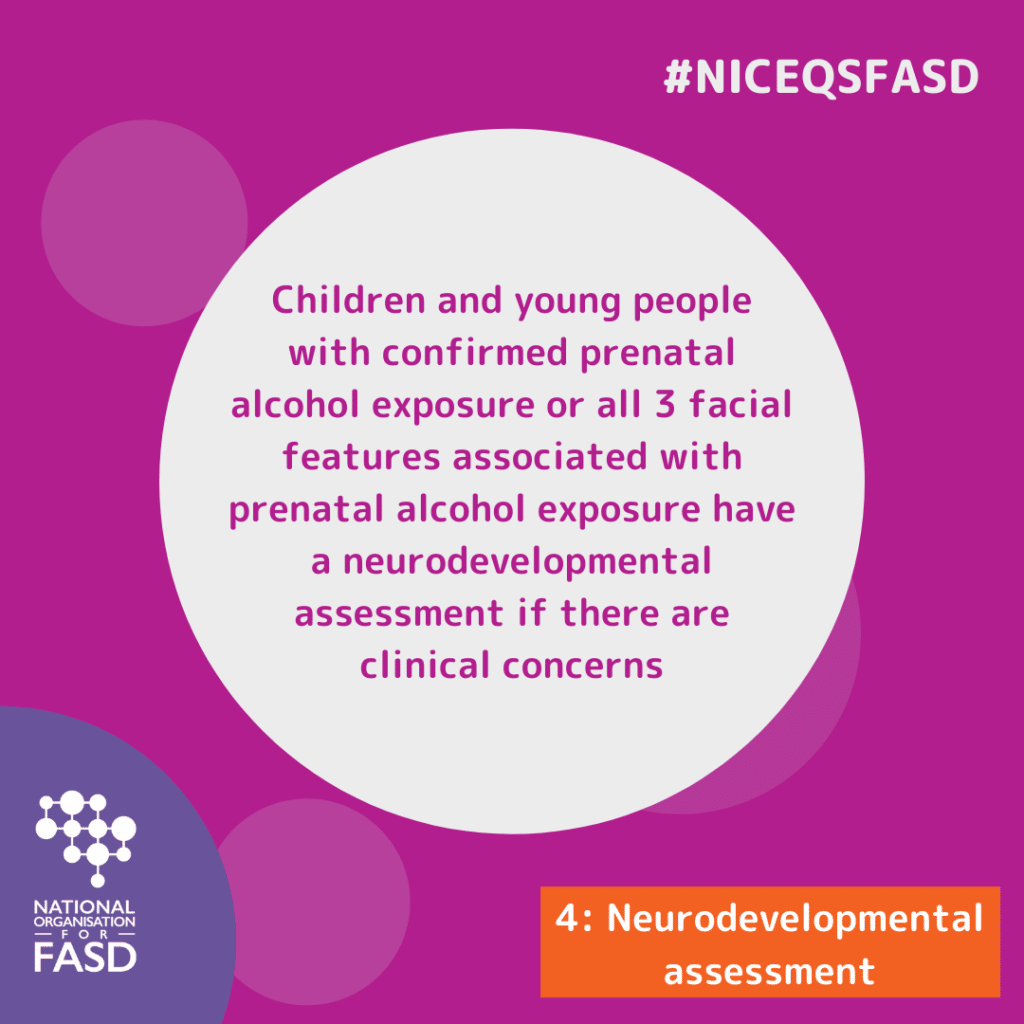
It also says, “Primary care services give training to GPs to raise awareness of prenatal alcohol exposure as a possible cause of neurodevelopmental disorders. Community paediatric services, child development centres, and child and adolescent mental health services have training programmes for healthcare professionals on assessing and diagnosing FASD. They establish multidisciplinary teams and multidisciplinary approaches, and develop referral pathways for assessment.”
The Quality Standard states, “A neurodevelopmental assessment is needed to confirm, or rule out, a diagnosis of FASD [emphasis added].” It also says service providers should “ensure healthcare professionals with expertise in neurodevelopmental assessments have additional training in FASD… [and] enable professionals to join multidisciplinary teams that may be local, central or virtual.”
So, if a child is struggling, healthcare providers should assess that child’s needs and explore in a sensitive way if it was an alcohol-exposed pregnancy. If it was an alcohol-exposed pregnancy and there are concerns, that child should have a neurodevelopmental assessment to get to the core of the challenges.
This again will be a sea change for those with FASD or possible FASD whose families often struggle to get professionals to even consider FASD as a possible diagnosis, or who are wrongly told they must have certain facial features for a diagnosis (these facial features occur in less than 10% of people with FASD). NICE, along with the DHSC FASD Health Needs Assessment of September 2021, now blows old-school thinking out of the water and repeatedly comes back to the point that those who haven’t got training need to train-up and get on board.
NICE, along with the DHSC FASD Health Needs Assessment of September 2021, now blows old-school thinking out of the water and repeatedly comes back to the point that those who haven’t got training need to train-up and get on board.
Sandra Butcher Tweet
Giving women the information they need to make informed choices and ensuring fetal alcohol exposure does not go unnoticed
Of course, prevention is best and the first two statements in the quality standard are about ensuring women are given written and verbal advice throughout their pregnancy because “There is no known safe level of alcohol consumption during pregnancy [emphasis added] and the UK Chief Medical Officers’ low-risk drinking guidelines state that the safest approach is to avoid alcohol altogether to minimise risks to the baby.”

“This includes information that the risk of harm to the baby is likely to be low if only small amounts of alcohol have been consumed but that further drinking should be avoided. They use a non-judgemental approach, discuss any concerns and provide support according to the woman’s needs, which may include a structured conversation, help to stop drinking through a brief intervention and signposting, or referral to specialist services.”
This isn’t about shaming or blaming, but about getting the right supports in place where needed and helping women to make choices to support healthy pregnancies. “Women should be asked about their alcohol consumption in a sensitive, non-judgemental way. Women who wish to discuss their alcohol use should be asked about the quantity, frequency and pattern of drinking, and this should be documented in their maternity records. This information may also help support early diagnosis and treatment for children with fetal alcohol spectrum disorder (FASD).”

Some may remember the brouhaha that erupted when a draft stated this should also be noted in the child’s records. Let’s be clear, this NICE Quality Standard does NOT say that it cannot be noted in the child’s records. For example, if mum gives approval for this there’s no problem at all, and a recent poll of 2000 women conducted by OnePoll, showed the vast majority of women do not object (only 10% opposed this). The poll also showed the vast majority of women expect and rely on midwives and other medical practitioners to give them the “latest information about the risks of alcohol in pregnancy.”
Beware of specialist interest groups twisting this narrative about the risks of alcohol in pregnancy or FASD deniers saying there isn’t enough evidence. This argument is debunked, and their vocal, ill-informed narrative is finally demolished and the country will be healthier as a result.
Sandra Butcher Tweet
This is a good day, an important leap forward but much work needs to be done
The NICE Quality Standard will set in motion changes that sadly may yet take some years to work through the massive NHS system. However, the changes will start from now. It focuses on children and young people – the very young identified at birth as being alcohol exposed may still fall through the cracks if their early development is not carefully tracked and there is a big hole still when it comes to diagnosis and support for adults.
The training needed will take time, as there isn’t yet enough available and we have to guard against new training that is not based on the latest understanding. These battles are ongoing.

But everybody in the FASD community should sit a little bit taller today. After decades of fighting for this moment, FASD has been recognised. People with FASD and their families have been seen and heard. It’s a new day. Now we need to do all we can to make sure our local, regional and national decision-makers understand this and take action side-by-side with our community – they need to engage us in their discussions and deliberations as we work together to create brighter tomorrows.

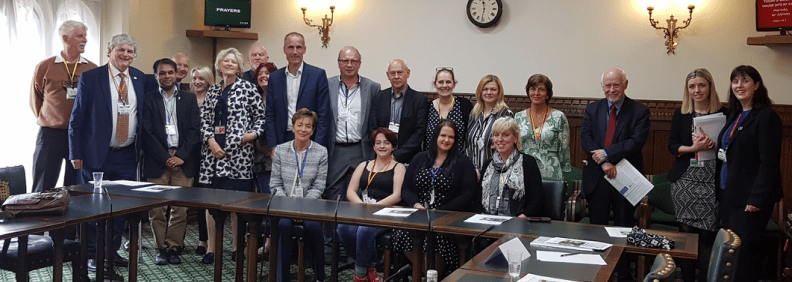
You can find an accessible summary of the NICE Quality Standard on FASD, or the full, original document from NICE using the buttons below.

